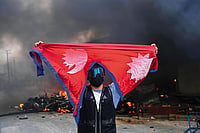As Monkeypox has been reported in several countries in the West, the Indian government has directed the National Centre for Disease Control and the Indian Council of Medical Research to keep a close watch on the situation, according to official sources.
An official source told PTI that Union Health Minister Mansukh Mandaviya on Thursday directed the National Centre for Disease Control and the ICMR to keep a close watch and monitor the situation in India.
The Union health ministry has also directed airport and port health officers to be vigilant.
The source added, "They have been instructed that any sick passenger with a travel history to Monkeypox-affected countries be isolated and samples sent to the BSL4 facility of the National Institute of Virology in Pune for an investigation."
Cases of Monkeypox have been reported in the UK, the USA, Portugal, Spain, and some other European countries.
In humans, the symptoms of Monkeypox are similar to but milder than those of smallpox. It typically manifests in humans with a fever, rashes and swollen lymph nodes and may lead to a range of medical complications, according to the World Health Organization.
Monkeypox is usually a self-limited disease with the symptoms lasting from two to four weeks. It can also take a severe from, with the WHO saying the case fatality ratio has been around 3-6 per cent in recent times.
Monkeypox virus is transmitted from one person to another by close contact with lesions, body fluids, respiratory droplets and contaminated materials such as bedding.
The WHO says the clinical presentation of monkeypox resembles that of smallpox.
Transmission of the disease can also occur via the placenta from mother to fetus (which can lead to congenital Monkeypox) or close contact during and after birth, the world health body says.
While close physical contact is a well-known risk factor for transmission, it is unclear at this time if monkeypox can be transmitted specifically through sexual transmission routes, according to the WHO.
(With PTI inputs)





















